
It was a typical Sunday morning for stockbroker Mark Bankord. He had played a round of golf with his buddy and now they were sitting in their cars — he in his Porsche and his friend in a Mercedes — at an intersection in front of a church in Rockford, IL on their way home. They decided to race to the next intersection.
Inside that church at services was his wife, Sherri, and their four children. Bankord revved his engine and took off on a newly paved highway in front of the church. “We raced and he beat me to the next stop sign. That began to do something in me that kind of rang that bell of ‘there’s never enough,’” Bankord says.
That was evidenced by what happened the next day. “I went to the auto dealership and traded in the Porsche for a car like my buddy’s, but a little nicer — a Mercedes SL two-seater. I walked out of there and drove in my driveway and something began to become unglued in me. I didn’t know what it was.”
Bankord went to church the next Sunday with his wife and “God started to show up in my life and that led to December 17,1989 and the recognition that nothing was going to fill the void in my life other than Christ himself. I gave my life to Jesus that day and everything changed.”
What Bankord, now 50, says he came to realize was that “the pursuit of the world’s stuff was a finish line that always moved.”
Church Executive: How much of the “world’s stuff” did you have then?
I was very successful in my marketplace career. I was a member of the country club, owned multiple automobiles, which I would trade in at a moment’s notice if I saw one that looked better. I was really caught up in the chase of the world’s successes. I was looking for significance through the wrong lens, through economic success that never fills you up. Now I didn’t know that until I came to realize that there was always something better, bigger, faster and fancier.
What did you do after giving your life to the Lord?
The first thing I did was go back to my office. I laid out on my office floor, broken. Then I penned a letter to all my country club friends, not condemning or convicting them, but just talking about the transformation that had happened that day. I quickly began to liquidate all those things that I chased. I resigned from the country club and actually sent my golf clubs down to our second home on the Gulf of Mexico so I wouldn’t be tempted. In a cold turkey move, I stepped away from chasing the world’s things to pursue Him.
So what are you driving today?
I’m driving a GMC Yukon. Don’t get me wrong, I still like cars, I like vehicles.
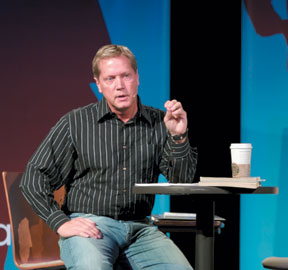 There’s nothing wrong with owning a nice car or belonging to a country club. But my identity was wrapped up in those things. I was a hostage to my pursuits. At that time, my four kids were 5, 3 1/2, and the twins were two. I am so grateful for the change because I would have missed the most significant blessing in my whole life, having the chance to know them and love them and watch God transform their lives and become the young people they are today.
There’s nothing wrong with owning a nice car or belonging to a country club. But my identity was wrapped up in those things. I was a hostage to my pursuits. At that time, my four kids were 5, 3 1/2, and the twins were two. I am so grateful for the change because I would have missed the most significant blessing in my whole life, having the chance to know them and love them and watch God transform their lives and become the young people they are today.
What level had your profession taken you to?
I was the youngest in the presidents’ club; I was the youngest member of the country club. I was all these things that just kept feeding this frenzy of competition and success that never filled my soul. Whatever you want to measure, I met that goal. But when I got there, there was nothing. It was hollow, empty, and my darkness caused me to pursue the next ego trip. I really lived for applause.
So after your conversion, the question of “what now?” came up. Your pastor at the time pointed you to a group called The Foundation.
The Foundation was sponsored by Bob Buford [Leadership Network] and led by Bill Hybels [Willow Creek Community Church] who had launched it. They gave pastors they’d invited two invitations to send two couples from their church to experience this. It was for people who were really successful in the marketplace and who were trying to figure out how to blend their work and their faith. That was a breakthrough for me, because I didn’t think you could do that.
I waited six months [for the Foundation sessions] and it was one of the most painful things, because I continued to do my business but my heart wasn’t in it. I showed up for the first Foundation conference and experienced an amazing breakthrough. There were about 200 couples, all very, very successful in the marketplace, trying to figure out how to blend their work and their faith. It was the annual fuel that Sherri and I lived on for many years in our spiritual journey.
In the week leading up to giving my life to Christ, my daughter, who was 5 years old and in kindergarten, said to me, “Daddy, all of the things that we have are really not ours, they are really God’s.”
And I said, “Ashley, that’s sweet, but that’s not true. I’ve worked hard to get everything that I’ve got. Everything we have is ours, and we get to claim it.” I said all that to a 5-year-old, and she argued back and quoted Scripture to me. That was embarrassing and humbling. It rocked me. So that day I prayed and came to recognize that, in fact, she was right. That all that I was and all that I had was His, that I can’t claim any success, and that each one of us is uniquely wired by God. So I said to Him, “whatever this means, use my gifts any way you want. I’m in. I understand that they are your gifts to me.”
Out of The Foundation experience you eventually founded a different worship service at the church you and Sherri were attending?
We’d look around and saw the potential of the people sitting there. But then I’d watch people go from the front rows to the middle to the back to the balcony and then they’d just be gone. The church was not contributing to their spiritual growth. They concluded that “if this is what it is, then I’m going to do life like everybody else, but I’m going to go to heaven.”
Sherri and I had a moment in 1995 where we looked at each other and said “Okay, are we going to be part of the problem, which is to do the same as all our friends, or are we going to be part of the solution?” We committed that day to be part of the solution.
Bill Hybels had taught about 100-fold Christ followers, saying that the expectation is “to whom much is given, much is expected.” We went home and said “OK, we’ve seen the problem, God’s revealed it to us, we’ve heard his calling, and we’re in. Now what do we do?”
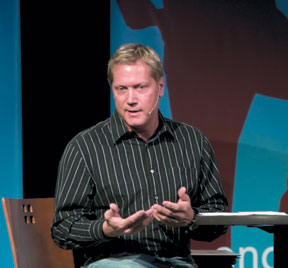 We spent about two years going through the organization structure of our local church to start a new, fresh work at that church using creative communication, drama, media, and what we called transformational teaching: teaching that was practical and relevant, the kind we’d experienced at The Foundation.
We spent about two years going through the organization structure of our local church to start a new, fresh work at that church using creative communication, drama, media, and what we called transformational teaching: teaching that was practical and relevant, the kind we’d experienced at The Foundation.
The reality was the pastor was very open to it; the rest of the infrastructure was not. They ultimately approved us doing it for two years and it started out strong, but they let it go two weeks and then shut it
down.
Hundreds of people had come, not just a few. The church at the time was maybe 1,600 and our first service on a Saturday night had 350 or so.
So after just two weeks they closed it down. How did you take that?
If the story ended there it would reflect poorly on me and that church. Here’s the good news: Over time, God revealed to us why He, not they, shut it down. It was because we didn’t understand the unique work of that local church and he really needed what we were going to do to be a fresh work and a blank piece of paper — a new wineskin.
Every day I’m so grateful that they did what they did because the unique work of God at Heartland may not exist, let alone be as fully released as it is today.
For two years we literally grieved. We were heartbroken because it seemed so clear and we could feel the momentum. We could see the people who were drifting away come back. It was amazing validation that what we were thinking and feeling was accurate. We felt so strongly, in unity, that God was up to something and it wasn’t going to be quenched or stopped.
Did you then immediately form Heartland?
No. For a year we drove from Rockford into Willow Creek Community Church [in South Barrington]. We spent another year planning. Over the years I had gotten to know Bill Hybels and he had given me great wisdom on many things.
My wife kept asking, “If we’re going to start a church, who’s going to do the teaching?” Because if we were going to be committed to what we believed the call was, then we needed to have teaching at the level we’d experienced at The Foundation — transformational teaching week in and week out. Didn’t matter who it was, it just needed to be absolutely dependable and predictable.
There were two videotapes on our TV that Bill Hybel’s assistant had sent to us. He wanted us to see some fun programming they had done over the last few months when we weren’t able to be at the service. Sherri asked, “Why don’t we do videotape teaching?”
You have to understand, video teaching was not being done anywhere in the country. It was not that we heard or read about it, this was late 1997. We looked at each other and said, “No, come on,” and we laughed out loud. But then we said, “Why not”? Sherri had an amazing cassette ministry where she was sharing the Willow teaching with friends and they were so hungry to hear teaching they could apply to their lives. And we said, “Wow, maybe we could do that.” Finally, I got up the courage to call Bill and tell him about this crazy idea.
What if people could experience this kind of teaching but we wouldn’t be a church? We’d just bring all our friends together, we’d show them this great teaching and then we’d send them back to their church.
You wanted to just bring friends together, not start another church? But Hybels wanted you and Sherri to lead and to start a church?
Bill said, “I’ve heard your story, I’ve seen you and Sherri and your life and your heart, so here’s what I want to do: I’m in if you’re in.” And I said, “well, of course we’re in.” What I thought that meant was we were in, as in being part of the church and I’d probably be on the board and we would attend there. But I was kind of brokering this idea because I was going to hand it off to a pastor. He said, “If you will lead, I’m in. Let’s give it six months and see what God is up to.”
Bill also said we’d have to be partnered with a pastor and “if God’s hand is on this you’ll know who that is.” I knew who it was in a heartbeat. I’d already been talking to Doug Thiesen; he was the worship leader at the church we had attended. Doug shared our passion for applicable, relevant teaching and was eager to play a role. So he became our lead pastor and I assumed the role of directional leader.
We rented the auditorium at the school of medicine in Rockford, which seats around 400. Our first service had 118 people attend. We did everything you would expect in a church except that the message was on videotape. The next week we had 220. Over the next eight weeks we went from that original 118 people to more than 750 people. People would be transformed and they would tell their friends. It’s been happening like that for 10 years now. In 2006 we bought a 350,000-square- foot shopping mall and about half of it now is the church. These days there are about 6,000 people coming on weekends.
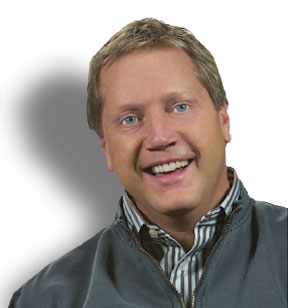 We have great teaching every week. Sherri and Doug largely select the messages. That’s just the truth. We’ve had this amazing blessing of being able to use some of the best teaching on the planet and then take the best of that and present it at Heartland. People know week in and week out it will be a transformational experience. They can come and bring their friends this week, next week and or any week and it’s going to be fantastic teaching that makes sense to their friends.
We have great teaching every week. Sherri and Doug largely select the messages. That’s just the truth. We’ve had this amazing blessing of being able to use some of the best teaching on the planet and then take the best of that and present it at Heartland. People know week in and week out it will be a transformational experience. They can come and bring their friends this week, next week and or any week and it’s going to be fantastic teaching that makes sense to their friends.
Something has changed in the past year in your model?
When we moved to the new facility, we brought on Mike Breaux, a gifted and unique teaching pastor at Willow Creek; he is actually on both staffs. He will teach live 22 weekends at Heartland and about 20 at Willow each year. We are sharing a teaching pastor around the value that we are committed to transformational teaching every week, whether it’s live or on tape. And Mike’s heart has been captured by what God has been doing at Heartland. We’ve worked out this amazingly cool partnership where he’s on both leadership and teaching teams at two churches.
You have some views about the role of senior pastors today?
In a unique way God rewrote the job description, where the teaching comes from great teachers and the leadership comes from people who’s primary gift is leadership. What Scripture talks about, where the whole body of Christ is fully functioning, is an attribute to a lot of what God has done at Heartland; that from Day One we lived in and loved serving in our spiritual gift, not in something that was painful and hard to do, or overwhelming.
I’m convinced when you know your spiritual gift and you are serving in it and are called to it, you actually get fuel from it as opposed to getting drained by it. It is the Holy Spirit and your spiritual gift coming together; and when they do, you can do it all day long. When you are out of your spiritual giftedness, then it is your humanness that’s driving your effort.
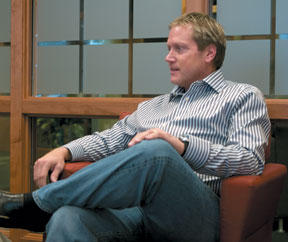 Pastors say to me, “If only I could just teach and shepherd or if only I could just lead and administrate,” but the senior pastor job description is too big. It was really designed for about 75 people in a congregation and they put it all together because they needed someone fulltime. “If the pastor does all these things, then we can pay him a fulltime salary.” Well, the church of the 21st century has just grown way past that.
Pastors say to me, “If only I could just teach and shepherd or if only I could just lead and administrate,” but the senior pastor job description is too big. It was really designed for about 75 people in a congregation and they put it all together because they needed someone fulltime. “If the pastor does all these things, then we can pay him a fulltime salary.” Well, the church of the 21st century has just grown way past that.
How do you see the role of the senior pastor?
I really believe that God is recreating the senior pastor role. I think there is a chance that the Heartland model is the beginning of new oxygen being blown into the role that, in the past, has destroyed and overwhelmed pastors. It is one of the toughest jobs on the planet and I don’t think it’s because the heart’s wrong, I don’t think it’s because the church is wrong, what I really think is it’s just that we haven’t stopped long enough to upgrade the job description to the reality of the world today. Too many churches use a job description that is 100 years old when the body of Christ and the giftedness of people need to be released.
How you can be fired at Heartland
At Heartland there are two things you can get fired for, and we’ve done it.
One is not honoring the giftedness of volunteers and aligning and releasing them. It’s subjective, but you’ll be terminated because we so hold the value of engaging and releasing the body of Christ in the ministry of the church.
You’ll be fired if you regularly do an event or experience or ministry where you are over staffing and not giving people actual activity to do so that when they walk out they say, “Man, they needed me and God showed up in my being there.”
Second thing you get fired for at Heartland is speaking poorly of any other church. Frankly that comes out of the roots of what God took us through in those early days when we were bitter and angry and broken. God was real clear and he said listen, here’s the deal, you have no right to speak poorly of the bride of Christ anywhere and you don’t know what I am doing in that church, so shut up! Don’t criticize an environment you don’t have first hand knowledge of. — Mark Bankord


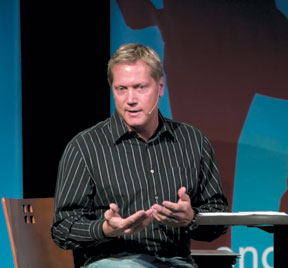

I must say that I’m impressed. I was born and raised Catholic. My kids go to a Catholic school. I use to say if anyone asked, actually think as I do not talk down on any other church either, that “Heartland” was not a “church”. How I was wrong. After reading this story, along with 2 years sobriety and being open minded I must say you have a great thing going. To be truly humbled and knowing what it is like to drive a new Mercedes and have money I understand and connect fully. I have made money, lost it, get caught up in the materialistic life as you mentioned. I have always prided at myself at being someone who helps others. I have seen and helped others well less fortunate then us in counties that have nothing while in the military. What I’m getting at is the road of less materialism and selfishness and giving it up to God and let him lead you the way is apparent. I will attend a service soon to check you out. Not sure yet if I’m going to abandon the Catholic Church. Thanks!